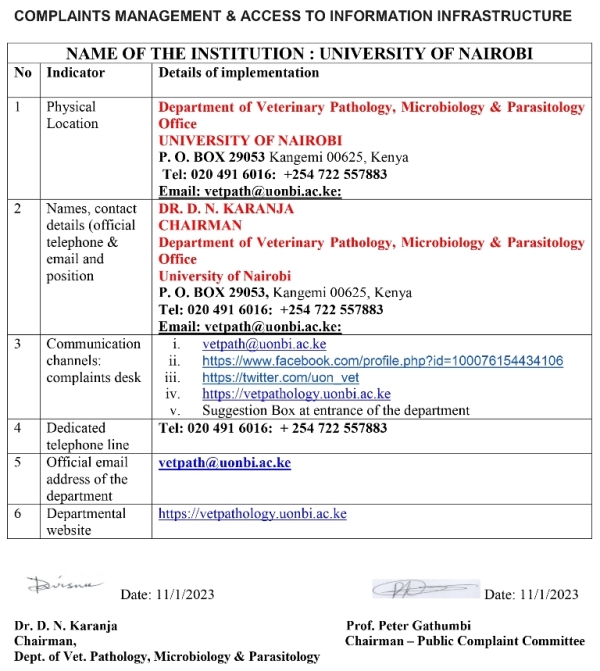Training in Agriculture and Veterinary sciences started with a Diploma certificate in veterinary training in 1942. The degree program in Veterinary Sciences was launched in July 1962. The Faculty of Veterinary Sciences was then a part of Makerere College of the University of East Africa. The Department of Veterinary Pathology and Microbiology was among the first departments that started with the set-up of the faculty of Veterinary Sciences of the University of East Africa, Makerere on July 1, 1962.
The University of East Africa was dissolved in July 1970, following the strong urge for autonomy for the newly independent countries of East Africa, to establish respective universities. As a result, the University of Nairobi was established in 1970. The Faculty of Agriculture was started at upper Kabete campus to join the Faculty of Veterinary Sciences as part of the University of Nairobi.
The Department of Veterinary Pathology, Microbiology and Parasitology is located on Upper Kabete Campus on Loresho Ridge Road, off Kapenguria Road, approximately 2 kilometres from the main Nairobi-Kikuyu-Limuru Highway. It is approximately 15 kilometres North-West of Nairobi City centre. The Department comprises the following sections: 1) Pathology section (gross-pathology, histopathology and clinical pathology); (2) Microbiology (Bacteriology, Mycology, Virology and Immunology) and (3) Parasitology (helminthology, entomology and protozoology); and carries out the following other services: diagnostic pathology, diagnostic microbiology, diagnostic parasitology, poultry clinic, and mycotoxin analysis.
The department is involved in:-
- The teaching of both undergraduate (Bachelor of Veterinary Medicine; Bachelor of Science in Wildlife Management and Tourism) and postgraduate (MSc and PhD) students in the following disciplines:- Pathology, Clinical Pathology, Microbiology, Immunology, Parasitology, Diagnostic pathology and Fish Science.
- The Department also supports teaching in other units within the College. These include some courses offered in other Departments in the Faculty including the Departments of Animal Production, Public Health and Clinical Studies, One course offered in the Department of Biochemistry in the School of Medicine) and also some courses offered in the Faculty of Agriculture [Department of Agricultural Economics and Department of Land Resource Management of Agricultural Technology (LARMAT).
- Carrying out problem-oriented research, which is geared towards improving animal health and production (domestic and wild, including poultry, fish and rabbits), human health, poverty alleviation and ensuring environmental sustainability; respective findings being disseminated to the general public via publications, workshops, seminars, conferences, farm visits and field days
- Offering demand-driven diagnostic services in diseases of both domestic and wild animals, including poultry, fish and rabbits; and zoonotic diseases. These diagnostic services also form part of the training component for both undergraduate and postgraduate students
Being an integral part of the Faculty of Veterinary Medicine , the department is charged with the responsibility of providing a leading role in veterinary education and training, research, diagnostic services, clinical poultry practice, and technology transfer (extension) at national, regional and international levels. To this end, it is faced with a challenge of promoting confidence in the Kenyan farmer of today, who continues to face challenges emanating from environmental changes, diseases (including emerging and re-emerging) and increasing costs of production. Consequently, the department positions itself to play a role in seeking solutions for these challenges.
Agriculture is the mainstay of the livelihoods of people and the economy of Kenya. Recognizing this fact, the department, as part of the Faculty of Veterinary Medicine, endeavours to train high-level manpower to serve various agricultural sub-sectors. At the same time, it conducts both basic and applied research towards increasing agricultural productivity in various ecosystems. Its members have also been involved in various national and regional committees responsible for promoting awareness on various diseases (enzootic, emerging and re-emerging ones) and drawing government guidelines towards disease prevention, control and emergency preparedness. Examples of these are:-
- Prof. Nyaga – Avian flu; Swine flu; Rift Valley Fever; Zoonoses Committee; Ex-Chairman, ASK Show- Poultry Committee (1982-1997)
- Prof. Bebora and Prof. P.G.Mbuthia are members of the Agricultural Society of Kenya committee for Poultry and Pigs and Prof. Debora has been Chairperson of this committee from 1998 to date
- Prof. P.G. Mbuthia is the OIE focal point on Fish Diseases

